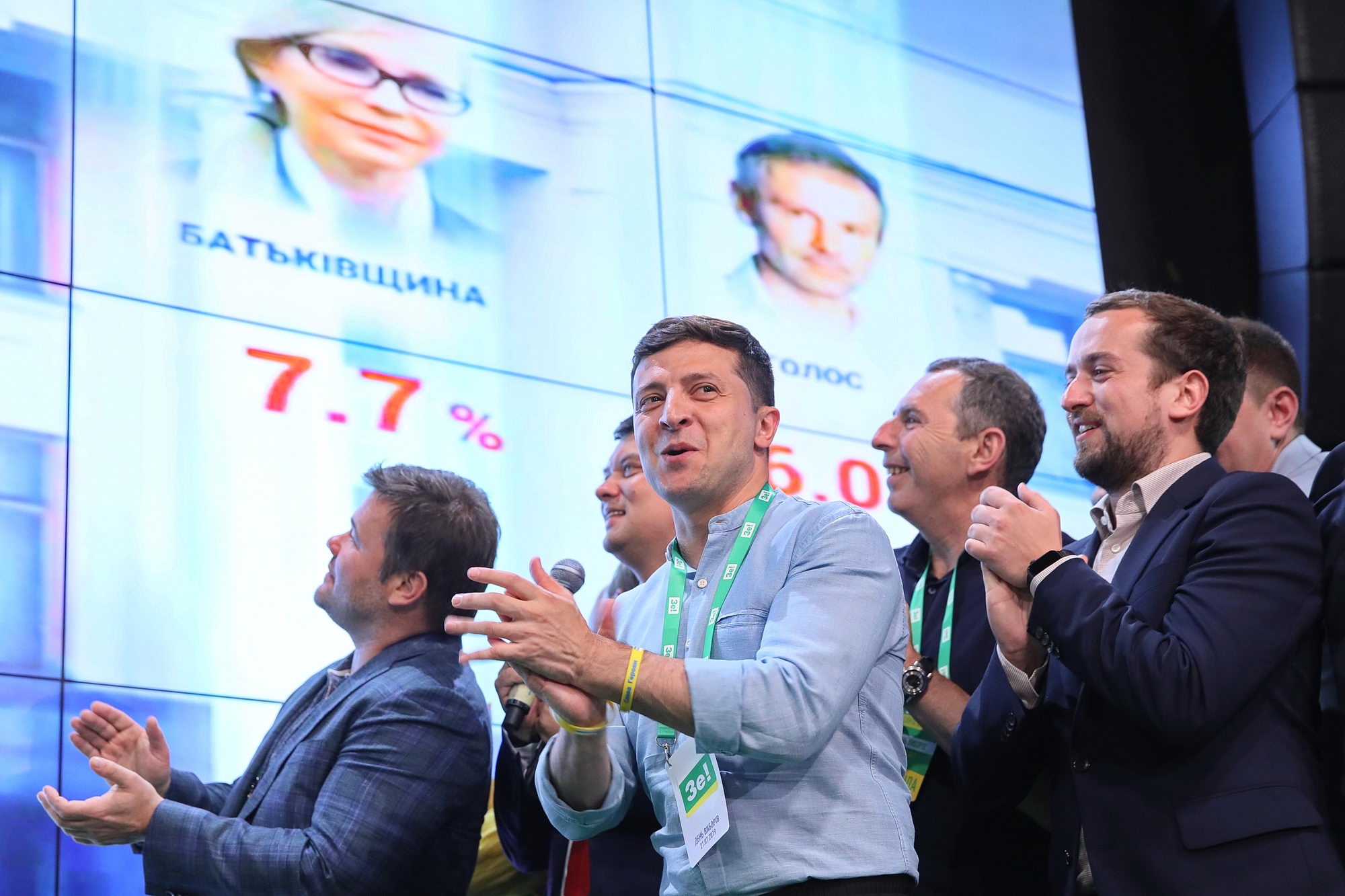A comedian turned politician, Serhiy Prytula, who was planning to revive the stagnating Voice party, said on June 7 he’s giving up on the project.
“I’m not leaving politics, I’m leaving a party which, thanks to its new leadership, has moved so far away from our initial principles that it is possible to say that the point of no return has been passed,” Prytula said in his statement published on Facebook.
JOIN US ON TELEGRAM
Follow our coverage of the war on the @Kyivpost_official.
Now, the 20-member Voice faction in parliament, which many once saw as a modern, liberal alternative to the country’s stagnant, populist political spectrum, is divided and is hemorrhaging the last of its political support.
During the 2019 parliamentary elections, the newly-created Voice had been the party of pro-western ideals, which recruited young journalists, lawyers and businesspeople. It was created by rockstar Svyatoslav Vakarchuk and its primary base included young, well-educated voters.
Two years later, the party’s leader has fled politics, electoral support has evaporated and the faction is drowning itself in public brawls.
“Vakarchuk’s departure was a knockdown, Prytula’s departure is a knockout,” says Anatoly Oktysiuk, a political expert at local think tank Democracy House. “The party is done.”
Young liberals
In late 2018, Ukraine was on the cusp of a new election cycle. Old parties and politicians were highly unpopular — Ukrainians wanted new faces.
All eyes were on comedian Volodymyr Zelensky and Vakarchuk, the frontman of popular Ukrainian rock band Okean Elzy. Both were testing the political waters, hinting that they will run in the March 2019 presidential election.
The west was banking on the pro-western Vakarchuk, meeting him in private and in public on multiple occasions. Yet, the musician abstained from running for the presidency, handing Zelensky an easy win.
On May 20, during his inauguration speech, Zelensky dissolved the parliament and called for early elections.
This gave Vakarchuk a second chance to become a big name in Ukrainian politics and he fumbled it. Running in Zelensky’s shadow, the Voice party, which aimed to get 10% of the vote, got only 5.8%, barely making it over the 5% electoral threshold.
Meanwhile, Zelensky’s Servant of the People party, packed with “new faces” of questionable backgrounds, won 253 out of 450 seats. Voice got 20.
In the run-up to the election, the Voice party was seen as the more mature “new” party. Employing well-known lawyers, journalists, activists and businesspeople, the Voice party was expected to enter a potential government coalition.
But Servant of the People didn’t need a coalition and Voice was forced into the opposition.
“They weren’t active in parliament, they began competing for internal leadership, drowned in infighting, they couldn’t agree on where they stand,” says Oktysiuk.
Party leader Kira Rudik, who succeeded Vakarchuk, acknowledged that the party was officially in opposition to Zelensky’s government only 1.5 years after the election.
Lack of support
Being an opposition politician wasn’t what Vakarchuk had expected. Soon after promising to lead the party in parliament, Vakarchuk abruptly left parliament in June 2020 to revive his music career.
The party included many big names, including Rudik, the former head of IT firm Ring Ukraine; Serhiy Rakhmanin, the deputy chief editor of the Dzerkalo Tyzhnya news outlet; economist Yaroslav Zheleznyak; anti-corruption activist Oleksandra Ustinova and Yaroslav Yurchyshyn, the former head of Transparency International Ukraine. However, Voice’s electoral campaign was built on Vakarchuk’s free concerts.
In June 2020, a year after entering parliament, the party polled under 3%.
The party’s attempt to regroup under Rudik failed. It lacked the support to compete on a national level and focused on several key cities – Kyiv, Lviv and Cherkasy. The party lost all cities, coming 17th by total local seat count.
One of the party’s best results was achieved in Kyiv.
Party candidate Prytula, who frequently appeared on Ukrainian television, came third with nearly 8% of the vote. Voice also gained 9 out of 120 seats in the Kyiv city council.
Lack of unity
The party’s dismal results at the polls forced Voice lawmakers to seek new ways to attract voters.
Yet, they strongly differed on how to do it.
Ten party lawmakers, including Yurchyshyn and Ustinova, returned to public activism, taking part in street protests and appearing in televised court hearings in support of activist defendants. Prytula supported this group.
The other ten, including Rudik, Zheleznyak and Rakhmanin took a more conventional approach, moving the party deeper into the Ukrainian political spectrum.
In February, when half of the party took part in street protests against the conviction of activist Serhiy Sternenko, Rudik gave an interview to Interfax in which she said her party is holding coalition talks with Zelensky.
“No matter if we’re part of a coalition (government) or we’re in the opposition, Voice will always support (the government’s) good decisions,” she said.
Servant of the People denied ever holding talks with Rudik. Voice members, who were taking to the streets in protest against Zelensky’s policies, urged Rudik to resign.
Instead, Prytula and several prominent lawmakers were excluded from the party’s leadership. Yurchyshyn and Ustinova publicly accused Rudik of hijacking the party.
After Prytula’s departure, Voice issued a statement saying that the ex-comedian placed personal ambitions above the party’s interests.
“We are not surprised that Prytula’s personal ambitions and a desire to get governing positions at any cost prevailed over a common goal,” the party stated.
“I understand his motives and I predicted that this would happen,” Yurchyshyn told the Kyiv Post.
“If the party throws out undesirable members and pressures those who have an alternative position concerning leadership, then the exodus of party members, especially those with high personal ratings, is expected,” he added.
According to Yurchyshyn, half of the party that is dissatisfied with Rudik’s leadership is assessing future steps.
Meanwhile, June pollsters give the Voice party a 2% approval rating. Rudik’s presidential rating is 0.4%, according to research company Rating Group.
You can also highlight the text and press Ctrl + Enter





